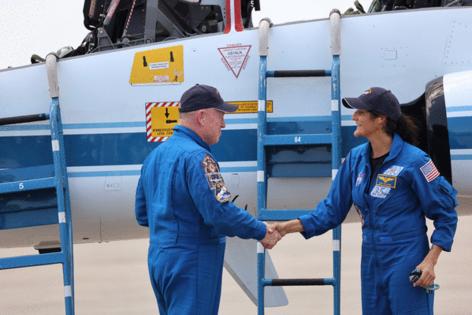Astronauts arrive at Kennedy Space Center as 1st crew for Boeing's Starliner spacecraft
Published in News & Features
CAPE CANAVERAL, Fla. — It’s not just another ride for a pair of veteran NASA astronauts who arrived to the Space Coast ahead of their flight onboard Boeing’s CST-100 Starliner.
Barry “Butch” Wilmore and Sunita “Suni” Williams, who both joined NASA’s astronaut corps more than two decades ago, will be the commander and pilot for the Crew Flight Test mission of the much-delayed spacecraft.
It’s set to launch with humans on board for the first time atop an Atlas V rocket from Cape Canaveral Space Force Station’s Space Launch Complex 41 on May 6 at 10:34 p.m., headed to the International Space Station.
The pair flew into KSC in their T-38 jets, landing at the former space shuttle landing facility Thursday afternoon and speaking with reporters ahead of the vanguard mission.
“This mission going off well? Of course we want it to do that,” said Wilmore from the tarmac. “Do we expect it to go perfectly? This is the first human flight of the spacecraft. I’m sure we’ll find things out. That’s why we do this. This is a test flight. When you do test, you expect to find things. And we expect to find things.”
Wilmore, who was part of NASA’s 2000 astronaut class, was the pilot for STS-129 on board Space Shuttle Atlantis for an 11-day mission in 2009 and then stayed on board the ISS for nearly five months from 2014-2015. Williams was part of NASA’s 1998 astronaut class and had two long-term stays on board the ISS, first flying in 2006 on Space Shuttle Discovery on STS-116 and flying home on Space Shuttle Atlantis on STS-117 in 2007 after 192 days in space. She then flew on a Soyuz in 2012 for a four-month stay on board.
This is the third trip to space for both, but the pair are not resting on their laurels with 11 days to go before launch. Wilmore said the coming days could be summed up in three words.
“Review, review, and review — everything we’ve been working on. There’s so much into this, there’s a fair amount of responsibility, obviously, that we hold,” he said. “We are ready. But we want to stay ready. We’ve got a week to continue to make sure that there’s not a single event that we have prepared for that we’re not ready for.”
This marks only the sixth new U.S.-based spacecraft to carry humans following Mercury, Gemini, Apollo, the space shuttle and the most recent entrant, SpaceX’s Crew Dragon. Dragon’s first human spaceflight came nearly four years ago, launching May 30, 2020, with its own pair of veteran NASA astronauts, Bob Behnken and Doug Hurley.
Williams said she got a pep talk from Behnken.
...continued
©2024 Orlando Sentinel. Visit orlandosentinel.com. Distributed by Tribune Content Agency, LLC.







Comments